Smart game plan vital
Exactly one year out from last Sunday night, a new world champion will be crowned in Auckland. Given that the November window of activity present the last chance for Ireland to face Tri Nations sides before they meet pool opponents Australia next September, the next few weeks provide an opportunity and a systems check for the Irish management.
Firstly let me say that I don’t buy into the concept of the four years cycle.















